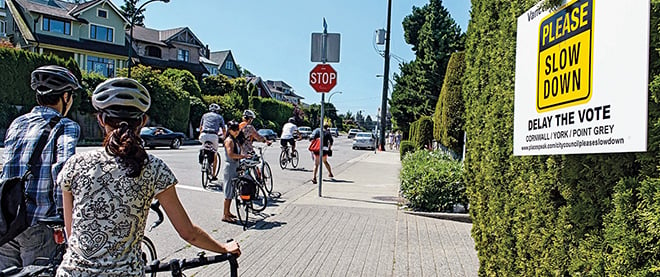Vancouverites feud over proposed bike lane in wealthy west side
A road through ‘millionaire row’ is the city’s latest class war
Ward Perrin / PNG; Carlos Osorio / CP
Share

Calgarians are digging out from the aftermath of a historic flood; Montrealers are picking up their jaws over the arrest of yet another mayor; and Torontonians remain transfixed by the foibles of the scandal-plagued Mayor Rob Ford. Vancouver, not to be outdone, is mired in a controversy that seems almost scripted for Lotusland, and has gripped the city through the dog days of summer.
A proposed seaside bike lane on Vancouver’s tony west side is raising complaints of class warfare, fudged data and an ideologically driven mandate being shoved down the throats of taxpayers by pedal-pushers at city hall. Strangely enough, council’s lone Green Party member is refusing to support it. For his part, Mayor Gregor Robertson, the city’s bike-loving, former organic-food magnate is abstaining from discussion. In late July, just as the controversy hit a fever pitch, Robertson announced he’d bought a property at the heart of the bike-lane battleground, and wouldn’t be casting a vote when the city debates the proposal—perhaps as early as this week.
The new route would close a key gap in a bike lane stretching from the downtown core to the beaches at Spanish Banks on English Bay. But it would also close off a stretch of swanky Point Grey Road; traffic along the street would drop from 10,000 cars per day to just 400. That would gum up streets throughout Kitsilano and transform the scenic street to “a private park for the super-rich,” as one recent headline bleated. Indeed, the value of mansions along “millionaire row”—including Lululemon founder Chip Wilson’s $37-million beachfront manse—would spike, according to local real estate guru Tsur Somerville, of the University of British Columbia’s Sauder School of Business.
Questions, meanwhile, have arisen about the data city engineers have used in selling the project to the public. The city claims 51 bike accidents have occurred along the proposed route. But figures from the Insurance Corporation of British Columbia show none reported between 2008 and 2012. The mayor’s office, meanwhile, continues to refuse requests for comment. This weekend, with public anger threatening to deep-six the project, cycling advocates took to the streets to support the new route.
So council readies for one of the ugliest debates in recent memory. More speakers have signed up for the forthcoming debate than for any other issue this term and depositions began Tuesday. Still, it’s hard to imagine how the new bike lane could get anything but a green light. Eight of Vancouver’s 11-member council belong to the ruling Vision Vancouver party, which is unified in its support. It’s likely the fears being voiced by opponents—the traffic nightmares, business declines for local retailers—will fail to emerge. And after yet another divisive debate over yet another bike lane, Vancouver will add a new route to a cycling network that has made it the envy of the continent.